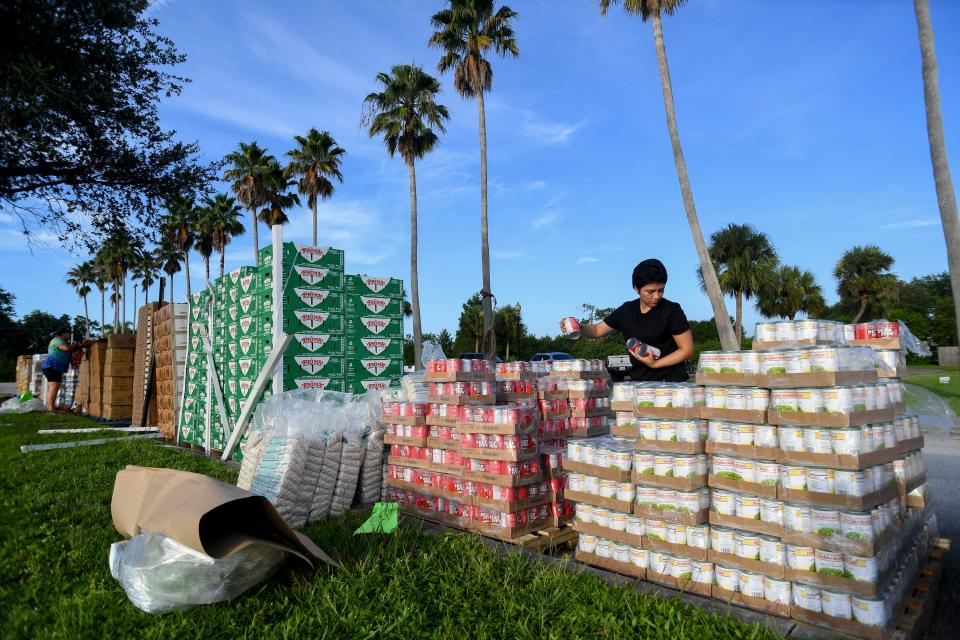Florida families struggle to cope with increased food prices at the grocery store
Elizabeth Gianotti feels “sick” thinking about her weekly grocery bill, which often costs over $300 to feed her family of six for just four days. Like many Americans, she and her husband, who both work in the health care industry, are having to change their lives to make ends meet.
Instead of sending their children to summer camps, they're increasingly having to keep the four kids under 15 at home. And she took a job as a telephone triage nurse working from home because it “helps save on childcare.”
“We just have to move money around and reprioritize,” Gianotti said while shopping at Aldi in Stuart one day in July.
Across the nation, grocery prices have hit all-time highs since the middle of the coronavirus pandemic in 2021. Some causes include inflation, COVID supply-chain bottlenecks and the Ukraine-Russia war, federal government reports say. From 2021-22, there was an 11% price increase — the highest annual increase in 40 years, according to a U.S. Government Accountability Office report released in March.
Food costs increase in Florida
In Florida’s main metropolitan areas, the cost of groceries has increased 31.3 points, according to retail analytics firm Datasembly, which tracks prices at over 150,000 stores nationally. The grocery price index it developed compares average prices at various times to the baseline of 100 in October 2019.
Prices for all items, except eggs, have remained high since January. The highest index increases since April were:
7.3% for beef, from 122.5 in April to 131.5 in July
6.7% for fruit, from 117.1 in April to 125 in July
5.9% for roots, from 121.6 in April to 128.8 in July
1% for grocery items like snacks, beverages, cereal and other items, from 130.5 in April to 131.2
Beef and veal prices spiked 2.4% from June to July according to data the Bureau of Labor Statistics released Aug. 10. The highest increase was in uncooked beef roasts, which went up by 6.5%.
Almost all items in the new consumer price index increased by 3.2%. The index tracks the prices of food, energy, electricity, commodities and vehicles. The food at home index increased by 0.3% over the month.
The only fluctuation and decrease nationwide has been for eggs. At the peak of “eggflation” in January, which was caused by an avian flu outbreak killing 58 million birds, the average price was $6.16. The price had dropped 30% to $4.27 on June 29, Datasembly reported. In Florida, the egg index has dropped by 42% in the past six months.

How people are adjusting to higher food prices
Shopping around at different stores to find the best deals is now the norm for some Treasure Coast residents.
Diamond Lee, a mental health counselor living with her husband and four children in Fort Pierce, spends her weekends going to Aldi, Publix and Walmart.
“Sometimes we can’t just get whatever we want," she said, adding her bill has doubled to around $800 a month.
People are having to get creative with recipes too. Kim Simone, a secretary in her 60s, now shops for rice and pasta because beef and chicken prices are so high. "Things do go up, but within the last year, it’s just been ridiculous.”

At the Treasure Coast Food Bank in Fort Pierce, the number of people coming to get free food has increased 15% in the past six months, as people struggle to pay rent and bills.
Since January, demand also has increased at the nonprofit Love And Hope In Action, Inc. in Stuart, which served 3,140 meals to 388 people in June, said President Brenda Dickerson.
"Most of these individuals are without a place to live, or barely hanging on to their place, due to the spike in the cost of living — rent, utilities, fuel, groceries, medications, etc.," Dickerson said.
The demand is not expected to decrease anytime soon, said Rob Ranieri, CEO of the nonprofit House of Hope in Martin County, which also has a food pantry and day bags for people who are homeless.
Summer is usually busier because of seasonal unemployment and schools not serving free lunches during the break, but other factors are contributing to the surge, he said.
The federal government in March ended a pandemic-era emergency allotment for food stamps, called the Supplemental Nutrition Assistance Program (SNAP), and expired the 2021 expanded child tax credit, he said.
The number of Floridians on food stamps has increased by about 0.4% since October 2021, averaging from 1.62 million to 2.94 million.
“Prices are expected to grow more slowly in 2023 than they did in 2022," Steve Morris of the U.S. Government Accountability Office said in an April 11 podcast, citing lower gas prices and slower-rising food prices for lowering the inflation index in June to its lowest level since April 2021.
"But it's still going to grow more than the historic annual average of 2%,” he said, predicting a 5-10% increase before prices settle at an 8% increase.
Ananya Tiwari is TCPalm's business reporter. You can contact her at ananya.tiwari@tcpalm.com.
This article originally appeared on Treasure Coast Newspapers: Florida families struggle with increased food prices at grocery store

